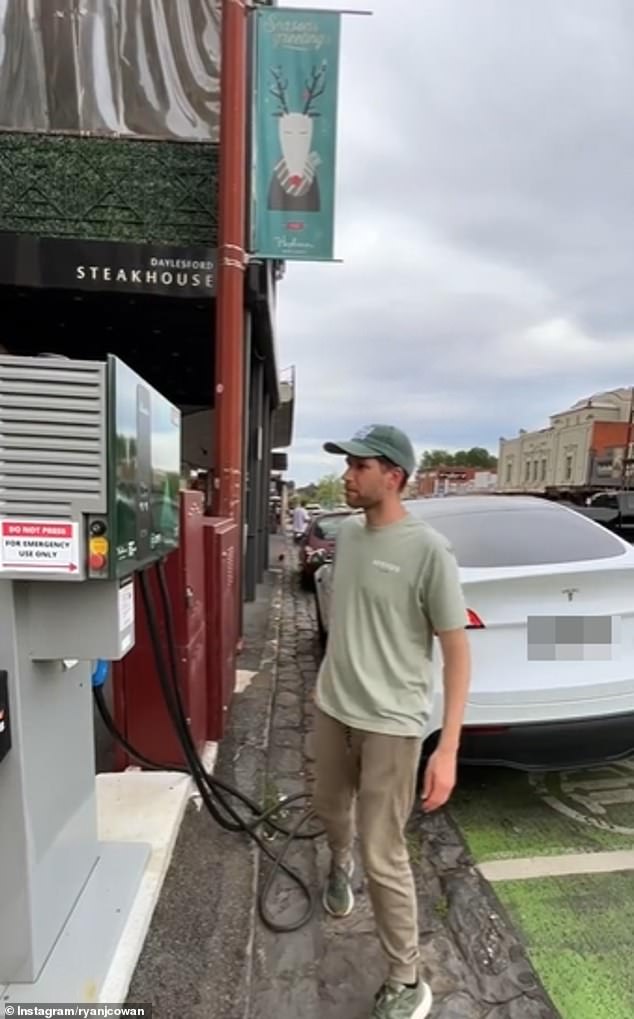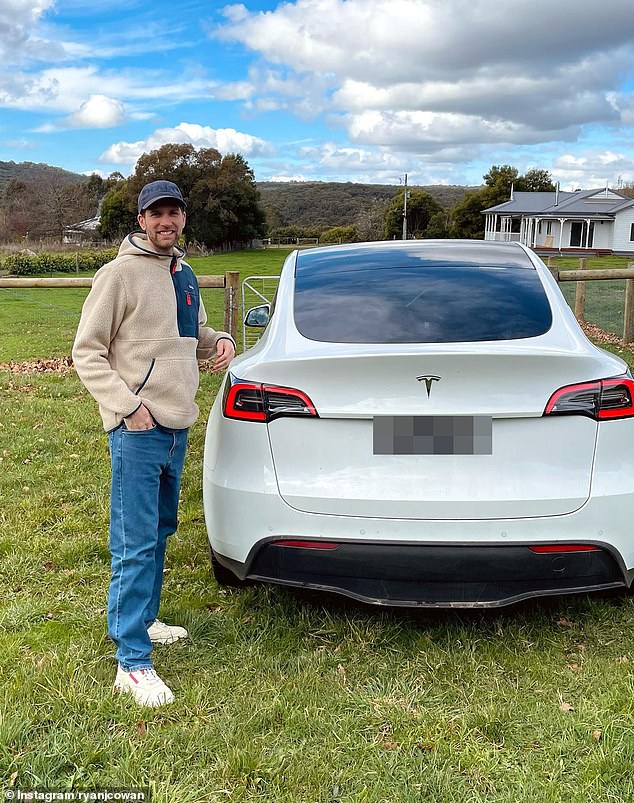Australian Tesla owner hits back at haters who say EVs are impractical
A Tesla owner is urging petrol drivers to switch to electric – despite Toyota’s boss claiming they’re not ready for our roads, aren’t as green as they seem, and ‘remain impractical for the vast majority of the Australian motorists’.
Toyota Australia sales vice-president Sean Hanley sparked the war of words at the Japan Mobility Show late last year.
“(Battery electric vehicles) make sense right now in places like Norway, where most energy is renewable and incomes are high, but Australia is not Europe,” he said.
‘In countries like Australia, our data suggests that hybrids could have a greater impact than full electrification in removing carbon emissions.’
He argued that Toyota could make more hybrid vehicles using the same materials used to make one electric car, that electric vehicles are “in many cases powered by electricity generated from coal” and that they remain “impractical” for drivers.
But Ryan Cowan, an electric car enthusiast from Melbourne who owns a Tesla Model Y (and used to own a Model 3), believes people who drive petrol cars should try an electric car – and he’s sure they’ll be fans too become.
Melbourne man Ryan Cowan and his wife Paige moved to regional Victoria and bought a Telsla (pictured). The couple upgraded to a Model Y in anticipation of the arrival of their daughter last September
Mr. Cowan said he saves about $4,500 a year on gas since switching to his Tesla.
He pays about $15 to charge it on the road at Tesla’s supercharger stations and just $4.50 for a full charge at home with a special electric car energy plan.
“I know everyone thinks charging an electric car is a huge inconvenience, but I can tell you now, after more than two years of switching, that it is much more convenient because you can charge the car at home,” Mr Cowan said.
‘I certainly don’t miss going to gas stations. I’m 100 percent converted and I can’t even imagine driving a gasoline car again.
“You just have to own one to realize how much better they are and how they win you over.”
IS CHARGING A PROBLEM?
Mr. Cowan drives his Tesla for about three hours on a single charge, by which time he has about half of the battery left. It ensures that it is charged before it gets too low to prevent the battery from running out.
He said charging is only a hassle on road trips if he has to use a charging station that isn’t part of Tesla’s supercharger network.
On a recent trip to Daylesford, Mr Cowan was forced to charge his Tesla using an extension cord at his accommodation because the only charger in town was not working and he did not have enough battery to drive to a Tesla supercharger station.
Mr Cowan posted a video of the incident on social media and was mocked by many petrol car owners who highlighted the charging debacle as a reason why they would not want an electric car.
“Becoming dependent on charging infrastructure can be incredibly disappointing when it lets you down,” Mr Cowan says.

Mr Cowan has gained a following on social media for his videos showing the benefits of owning an electric car, but also the challenges – including charging ports that refuse to work (pictured) and the impracticality of towing a caravan.
He wants to see more charging spots in Australia so he doesn’t run into similar charging problems in the future.
Mr Cowan said electric cars can’t really make long journeys with a caravan because towing a caravan quickly drains the battery, almost halving the range. And if you need to charge, you must first disconnect the caravan.
Contrary to the Toyota boss’s view that hybrids are more practical for Australian drivers, Mr Cowan described them as a “dying breed”.
“It’s trying to combine the best of both worlds, but there’s still a huge internal combustion engine running underneath,” Mr Cowan said.
“It’s very clear to me that the future is EV, and hopefully Toyota will come along and accept that EVs are the future.”
ARE THEY AS GREEN AS THEY APPEAR?
Government data shows only 38 percent of Australia’s electricity last year came from renewable sources such as solar, wind and hydro.
The rest, 62 percent, was generated from fossil fuels, including coal, which are then used to power electric cars.
This has led critics to suggest that electric cars may not be as environmentally friendly if they rely on electricity produced from non-renewable sources.
But Mr Cowan argues that electric cars are still better for the environment than petrol cars, even if they use electricity from the coal grid.
“The power conversion you see in an electric car, from the research I’ve done, is about four times more efficient at converting power than a petrol car,” Mr Cowan said.
‘Even in the worst case, if you don’t have solar and you’re charging directly from the grid – as nasty as it is to have coal powering the grid – it’s still better.
“Our electricity supply in Australia is also becoming more sustainable by the day, so it will still be a more efficient solution than driving a petrol car.”

Mr Cowan said electric cars are the way of the future and are greener, more efficient, more convenient and cheaper to run than petrol cars
IS AUSTRALIA’S FUTURE REALLY ELECTRIC?
Mr Cowan believes the next step for electric vehicles is the development of electric vehicles and a larger SUV for families.
“I think it would be very persuasive and enticing for those thinking about switching if we just get a few cars of different sizes,” Mr Cowan said.
Chris Jones, national president of the Australian Electric Vehicle Association, says electric cars are ultimately cheaper to run than hybrids and are more environmentally friendly.
“When it comes to buying a new vehicle, the cost difference between a hybrid Toyota Corolla and an all-electric MG4 is small: less than $8,000,” Jones said.
“People would spend $8,000 on fuel over the next five years, so if you want to keep a car for a reasonable amount of time, the electric car is the better option on a financial basis.”
Dr. Jones said there are a small number of circumstances where electric cars do not yet meet the needs of motorists, but that they represent a minority of users towing “extremely heavy loads” in “very difficult driving conditions”.
“Everyone else’s needs are fully met by what is in the market and what will come into the market,” he said.
‘Toyota will soon be confronted with the fact that they have to make an EV, and a convincing one.’
Electric Vehicle Council CEO Behyad Jafari said Toyota’s criticism of electric cars and the development of hybrid vehicle technology had more to do with what the company had to sell than the interests of motorists.
“This is an attempt by them to defend their own shortcomings rather than admit, as they have done at the global level, that they were wrong and that they were too slow to get out of the electric car market.” , he said.
“Toyota’s market share in Australia has fallen and its electric vehicle market share has grown.”
Electric vehicle sales continued to rise in 2023. More than 87,000 electric vehicles were sold last year, accounting for 7.2 percent of the market, compared to 3.1 percent in 2022.
The Tesla Model Y is the first battery-electric vehicle to enter the top 10 sales charts, with more than 28,769 models sold. The SUV came in sixth place, just ahead of the Toyota Landcruiser.
Australians will have even more electric car models to choose from in 2024, with new entries from Jeep, Nissan and competitively priced Chinese manufacturer BYD.
